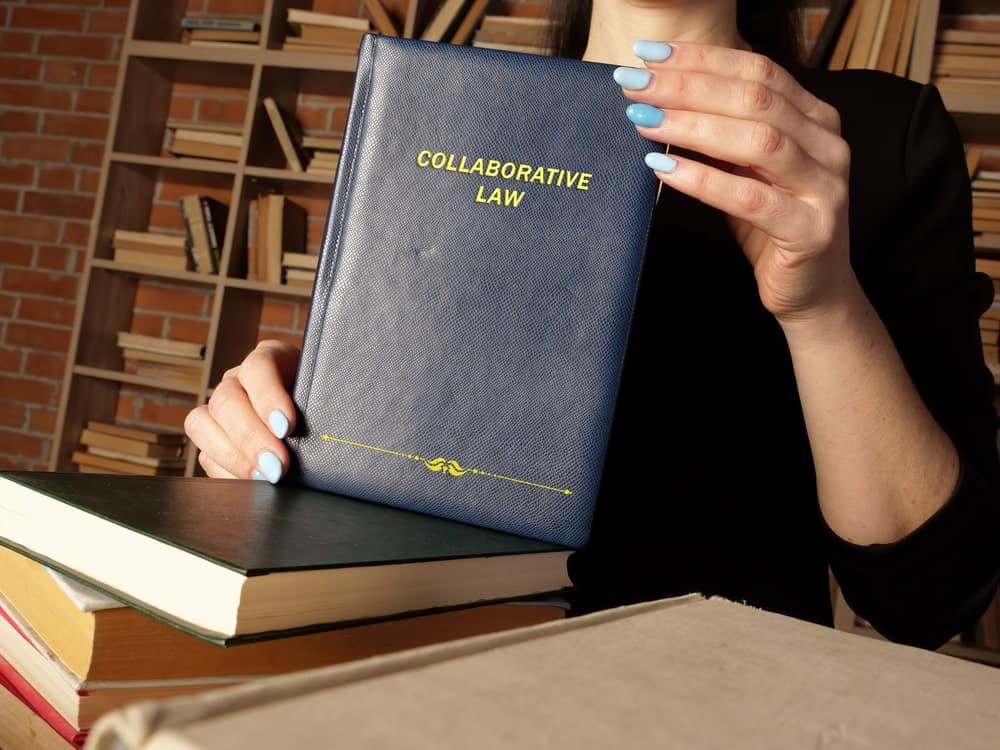
In BC, there are two general ways to reach a divorce agreement. You can have an agreement imposed on you by a third party via mediation, arbitration, or litigation or you and your spouse can reach an agreement via negotiation and/or collaborative divorce.
When couples decide that their marriage should end, they are increasingly turning to collaborative divorce as a less competitive alternative to more traditional divorce processes. Collaborative divorce can reduce the acrimony that is often inherent in the traditional adversarial processes.
Canada’s divorce law was originally designed to provide resolutions for adversarial spouses. Marriage ends for many reasons. The adversarial processes of litigation, arbitration, and mediation, contribute to negativity.
Most of the time, getting a divorce does not mean someone did something wrong; it means they probably should not be married. No matter what the reason, people who no longer wish to be married may find that a collaborative divorce is an option that helps spouses and their families move forward with positivity.
Read More → Getting a Divorce in Vancouver, BC
What is Collaborative Law in Vancouver?

In a traditional divorce, a third party (judge, arbitrator, or mediator) helps negotiate or litigate the terms of a divorce agreement. In collaborative divorce, the divorcing spouses work as partners and agree to:
- Avoid litigation and not go to court or threaten to go to court
- Treat each other with respect and communicate honestly
- Disclose all relevant information and documents
- Work to understand the concerns and needs of both spouses
- Reach an agreement that serves all involved parties
It’s important to note that there are no winners or losers in collaborative divorce. Both spouses agree to hire a collaborative divorce lawyer to serve as their divorce coaches. Though you each have your own lawyer, they do not work as adversaries as in traditional divorce.
Instead, they work together to create an agreement that provides more of a cooperative, win-win outcome. Collaborative divorce refocuses the stressful negative energy of working against each other and transforms it into the more positive energy of working toward a common goal.
Each spouse meets individually with their collaborative divorce lawyer to help sort out their needs (as an lawyer would in a traditional divorce) and then both collaborative divorce lawyers meet with both spouses together to create a settlement that works for both spouses.
It’s a cooperative, iterative process for moving from conflict to resolution.
Though it’s helpful, you do not have to be amicable or in agreement on all issues to begin working on a collaborative divorce. The framework for collaborative divorce encourages the use of experts.
These divorce coaches can help you navigate the potential minefields of poor financial, custody, and other emotionally charged decisions. As a result, collaborative divorce can be quicker, less costly, and less stressful than more traditional divorce processes.
The collaborative divorce team works together towards a common goal that is in the best interest of all parties involved. For example, if children are involved, collaborative divorce can help teach you and your spouse to work cooperatively in the best interest of your children.
It makes for a smoother, less challenging transition from a single home to two separate homes.
Divorce coaches can help you and your spouse create a co-parenting household that is in everyone’s best interest. A child specialist can help your children understand what is happening and talk about it in a safe environment.
Why use collaborative divorce in BC?
Even though collaborative divorce seems similar to mediation and other out-of-court dispute resolution methodologies, it demands a different type of commitment from both spouses and both lawyers.
If one or both spouses cannot follow through on that commitment or fail to fully disclose information, the entire divorce process will have to start over again from the beginning with new lawyers.
Collaborative divorce works well for spouses who are willing to work together. Spouses must be honest with each other and behave civilly and respectfully, but they do not necessarily need to be in agreement on every issue at the start.
Collaborative divorce is a good option for couples:
- Regardless of their sexual orientation or gender
- Legally married or common-law
- Who are parents or childless
- Regardless of ethnicity, race, or religion
Collaborative divorce can work for most Vancouver and BC couples if they are able to drop their adversarial notions of divorce. What’s most important is that both spouses commit to resolving issues together with the support of the collaborative team.
If the spouses and lawyers are committed to cooperating with the entire team, collaborative divorce can save time and money and make it easier to start over again after your divorce.
Is collaborative divorce right for me?
At Spectrum Family Law, we’ve even seen collaborative divorce work well with spouses who have a high level of conflict. Call us for a consultation and we can help you determine if collaborative divorce is the right choice for your divorce.
Generally, if many of the statements below are true for both spouses, collaborative divorce could be right for you:
- Both spouses are willing to work honestly and respectfully with coaches, lawyers, and other collaborative professionals
- Both spouses can commit to full, honest disclosure of financial and other relevant information
- There is so much conflict that both spouses cannot see a path to a mutual agreement, but want a civil, respectful resolution to your issues.
- Both spouses see value in getting guidance and creative solutions from professionals on handling emotions, finances, children, etc.
- Both spouses would rather work out solutions with a team than have a judge or third party make a decision for you.
What is the collaborative divorce process in BC?
In BC, the collaborative divorce process has four basic steps:
1. RETAIN COLLABORATIVE DIVORCE LAWYERS FOR EACH SPOUSE
To start the collaborative law process, each spouse should pick a lawyer who has completed training in collaborative law, mediation, interest-based negotiation, and other related topics. Be sure to meet with the lawyer so that you can communicate effectively. You should feel like you want to hear your lawyer’s opinion and that your lawyer has listened and understood what you wanted to say.
2. SIGN A PARTICIPATION AGREEMENT
When you and your spouse have each retained an experienced collaborative law lawyer with whom you can effectively communicate, the next step is to sign a participation agreement. The participation agreement officially begins the collaborative divorce process. If you are retaining divorce coaches, financial experts or other professionals, they should also sign the agreement.
3. PARTICIPATE IN “FOUR-WAY” MEETINGS
The heart of the collaborative divorce process is a series of four-way meetings that include both spouses, their lawyers and any specialists. The lawyers and professionals work with the spouses to negotiate the goals of the outcome based on the needs, wants and concerns of the family members. Typically, there are two to four of these meetings.
4. CREATE A SEPARATION AGREEMENT
Between each meeting, the parties gather documentation, consult with professionals, develop parenting plans, resolve parenting conflicts, explore options, etc. The meetings continue until a separation agreement has been reached. The two collaborative law lawyers prepare the agreement.
The final separation agreement may include parenting terms, child support, spousal support, division of assets, and disposition of debts. The separation agreement resulting from the collaborative divorce process is a binding contract enforceable by a judge.
Who can use the collaborative divorce process in BC?
Divorce can be a difficult and painful process, but spouses who use the collaborative divorce process can find that it is less painful and less expensive than more traditional divorce.
You do not have to be friendly or even in agreement to use the collaborative divorce process.
At Spectrum Family Law, we’ve seen collaborate divorce work well for many different personalities and relationships—even in relationships with intense disagreements.
But there are circumstances where collaborative divorce is not a good choice, including circumstances such as:
- A history of violence, an existing restraining order, a non-removal order, or other relevant court-ordered restrictions
- An obvious power imbalance between the spouses (e.g., a billionaire CEO and a spouse with no independent wealth or income)
- You don’t believe it is possible to negotiate fairly and/or safely with your spouse even with divorce coaches and professionals present
- You believe your spouse may be hiding assets or there is a history of your spouse hiding financial assets or information
- You expect your lawyer to aggressively advocate for you as they would in an adversarial process
- Your spouse will not agree to a collaborative divorce or you believe your spouse will terminate the process and go to court before the process is complete
If any of the concerns listed above apply to your circumstances, collaborative divorce is probably not a good divorce option for you. At Spectrum Family Law, we have helped many clients determine the appropriate divorce process for them.
Our Vancouver Collaborative Lawyers Can Help You
Throughout Vancouver, many divorcing spouses are choosing to use collaborative divorce to resolve their differences with less friction. At Spectrum Family Law, we can help you determine if collaborative divorce is the right option for you.
Schedule a consultation with a dedicated collaborative family lawyer.

Our Vancouver intake staff are standing by to help you. Call 778-452-0221 [toll free 1 (877) 402-1004] or contact us online for general inquiries.
We also have a dedicated intake form to help you get the ball rolling. Our intake team will review your specific case and advise you on the next steps to take as well as what to expect moving forward.
Our Vancouver office is open 8:30 a.m.—4:30 p.m., Mon—Fri.


Madison Lussier
FAMILY LAWYER
Assisting clients through some of the most challenging times in their lives has shaped Madison’s empathetic, professional, and trauma-informed approach to advocacy. Although she now specializes exclusively in family law, her confidence in the courtroom is largely derived from her previous experience in criminal defence.
The Legal Review Process by Spectrum Family Law
- Spectrum strives for high-quality, legally verified content.
- Content is meticulously researched and reviewed by our legal writers/proofers (usually local law students).
- Details are sourced from trusted legal sources like the Family Law Act.
- Each article is edited for accuracy, clarity, and relevance.
- If you find any incorrect information or discrepancies in legal facts, we kindly ask that you contact us with a correction to ensure accuracy.


